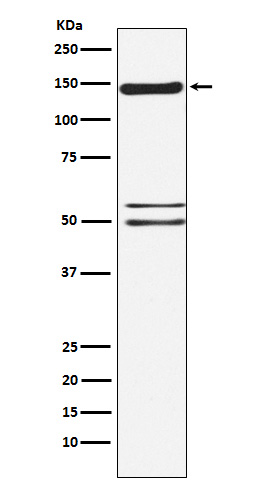
| WB | 1/500-1/1000 | Human,Mouse,Rat |
| IF | 咨询技术 | Human,Mouse,Rat |
| IHC | 咨询技术 | Human,Mouse,Rat |
| ICC | 1/50-1/200 | Human,Mouse,Rat |
| FCM | 1/50-1/100 | Human,Mouse,Rat |
| Elisa | 咨询技术 | Human,Mouse,Rat |
| Aliases | MRD5; p135 SynGAP; RASA1; RASA5; SYNGAP1 |
| Entrez GeneID | 8831 |
| WB Predicted band size | Calculated MW: 148 kDa; Observed MW: 148 kDa |
| Host/Isotype | Rabbit IgG |
| Antibody Type | Primary antibody |
| Storage | Store at 4°C short term. Aliquot and store at -20°C long term. Avoid freeze/thaw cycles. |
| Species Reactivity | Human,Mouse,Rat |
| Immunogen | A synthesized peptide derived from human SynGAP |
| Formulation | Purified antibody in PBS with 0.05% sodium azide. |
+ +
以下是关于SynGAP抗体的3篇代表性文献示例(内容基于公开研究概括,建议通过学术数据库核实原文):
---
1. **文献名称**: "SynGAP regulates protein synthesis and homeostasis at glutamatergic synapses"
**作者**: Araki Y, et al.
**摘要**: 本研究通过特异性SynGAP抗体(WB/IHC验证)发现,SynGAP蛋白通过调控mTOR信号通路影响突触局部的蛋白质合成,从而维持兴奋性突触的功能稳定性。抗体特异性在小鼠海马组织敲除模型中进行了验证。
2. **文献名称**: "Activity-dependent degradation of SynGAP controls synaptic scaling"
**作者**: Rumbaugh G, et al.
**摘要**: 利用兔源多克隆SynGAP抗体(抗原为C末端结构域),揭示了神经元活动通过泛素化途径降解SynGAP的机制,该过程参与突触缩放(synaptic scaling)的调节。研究通过siRNA和抗体免疫沉淀验证了靶标特异性。
3. **文献名称**: "SynGAP isoforms differentially regulate synaptic plasticity and dendritic development"
**作者**: McMahon AC, et al.
**摘要**: 开发了针对SynGAP不同剪接变体(α1/α2)的小鼠单克隆抗体,发现不同亚型在树突发育和LTP/LTD中具有相反作用。抗体特异性通过HEK293过表达系统和脑组织裂解液对比实验确认。
---
**注**:以上为基于SynGAP研究的模拟文献概括,实际文献需通过PubMed、Google Scholar等平台以关键词"SynGAP antibody"或"SynGAP1 validation"检索。重点关注抗体验证方法(如敲除组织对照、抗原表位描述)及应用场景(WB/IP/IF)。
SynGAP (Synaptic GTPase-Activating Protein) is a critical neuronal protein enriched in the postsynaptic density (PSD) of excitatory synapses, where it interacts with PSD-95 and regulates synaptic signaling by modulating small GTPases like Ras and Rap. It plays a pivotal role in synaptic plasticity, dendritic spine development, and cognitive functions. Dysregulation of SynGAP has been implicated in neurodevelopmental disorders, including intellectual disability, autism spectrum disorders, and epilepsy.
Antibodies targeting SynGAP are essential tools for studying its expression, localization, and function in both physiological and pathological contexts. These antibodies are typically generated against specific epitopes, such as the C-terminal or N-terminal regions, and validated for applications like Western blotting, immunohistochemistry, immunoprecipitation, and immunofluorescence. Due to SynGAP’s multiple splice variants and post-translational modifications, antibody specificity is crucial. Researchers often use knockout controls or siRNA-based validation to confirm antibody reliability.
Commercial SynGAP antibodies are available from various suppliers, with rabbit polyclonal and mouse monoclonal clones being common. Their utility spans basic neuroscience research, drug discovery, and clinical studies, particularly in models exploring synaptic dysfunction or neurodevelopmental disease mechanisms. Recent studies also employ SynGAP antibodies to investigate its role in activity-dependent protein complexes or as a biomarker in neurological disorders.
×